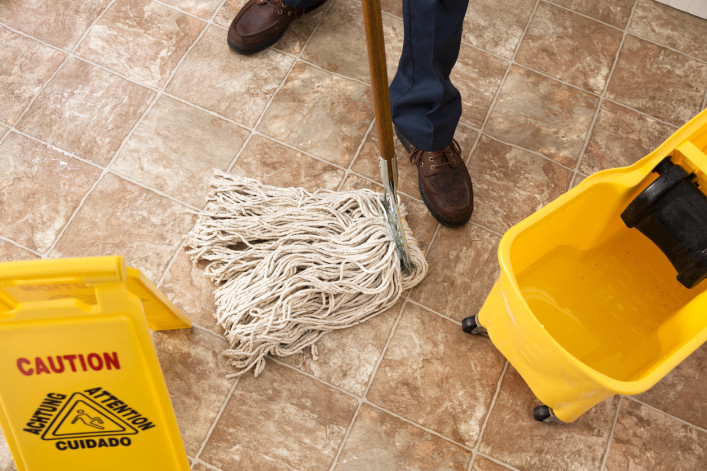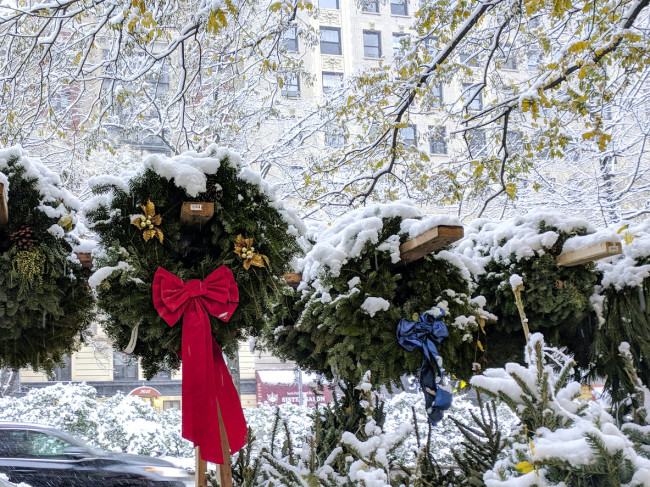In case you missed it
An open letter from your porter during the holidays

Years ago, our then-Annual Holiday Tipping Guide, which suggested New Yorkers tip their porters $20 to $30 (vs. $25 to $150 for doormen), sparked anger in one Manhattan porter, who says it is unfair that people in his field are tipped less than some other building employees during the holidays.
[This post was originally published in 2011 and was updated in 2016.]
Frank is a porter in the Financial District. Before working as a porter, he was a doorman in the same building. He decided to become a porter because the hours are better and he prefers being active rather than having to stay in the lobby all day. Here’s what he does as a porter, and why he thinks he deserves to get tipped as well as a doorman or concierge. We think it just might change your perspective.
In my building, doormen, concierges and porters all have the same starting salary, but when it comes to holiday tips, they get double or triple what we get.
In the building I work in, which has 330 units, porters and handymen make an average of $2,000 to $3,000 in tips during the holidays. I know one doorman last year who made $8,000 and change and another who made $9,000. It’s usually between $7,000 and $9,000. I’ll put it this way: A porter who was there for two years made three times less than a doorman who had been there for four months.
Porters and handymen are called "back of the building." When I was working front of the building, I was treated better. The same people who would say hello to me in the morning every day, now they just ignore me.
I think it's about stereotypes. People think porters and handymen are simple-minded people who just clean up. They think we never finished high school. But many of us, like myself, we're college graduates. This is an extra job for me. Also, tenants think that if a problem arises, they just go to the front desk and the doorman and concierge will handle the problem. But it’s really the porter who does.
I'll tell you what happened recently: A woman needed an old mattress taken out before her new mattress could be brought in. The concierge agreed to it, but he can't leave the lobby. So who do you think did it for her? The porters, of course.
We also get rid of the garbage and recycling, and we clean the elevators. Any vomit that the residents left on their crazy nights out? We clean that. We vacuum the floors, hose out front, clean the lounges and the gym. Anything that needs to be cleaned, basically, we take care of it. But we also do a lot of stuff outside of that.
When a tenant gets too drunk and passes out outside their apartment, we pick them up and put them back inside their apartment. We don't say anything when we see them the next day. You know how many times we find wallets and credit cards?
Tenants have the misconception that we work for the building, and the doormen and concierges work for them. A lot of people don't realize how much we do because they don’t see us every day—like they do with the doorman—but it's the porters and handymen who enter your home to fix things when you're away. It makes more sense to have a trusting relationship with people who enter your home, I think.
I don’t want to put down doormen—they work hard, too. I just want people to know that to make a building run properly, it's not just about the front desk. You can't have one side without the other, and I think we should be treated and tipped equally.
If I was to compare this situation to anything, it would be a play. When you go to a Broadway play, you see the actors. You don’t see the directors, the producers, the lighting people. The actors couldn’t do what they do without those people, but the actors get the applause. Nobody sees who’s behind it all. We're the people behind the scenes. They get the applause, we don't.
In my building, doormen, concierges and porters all have the same starting salary, but when it comes to holiday tips, they get double or triple what we get.
In the building I work in, which has 330 units, porters and handymen make an average of $2,000 to $3,000 in tips during the holidays. I know one doorman last year who made $8,000 and change and another who made $9,000. It’s usually between $7,000 and $9,000. I’ll put it this way: A porter who was there for two years made three times less than a doorman who had been there for four months.
Porters and handymen are called "back of the building." When I was working front of the building, I was treated better. The same people who would say hello to me in the morning every day, now they just ignore me.
I think it's about stereotypes. People think porters and handymen are simple-minded people who just clean up. They think we never finished high school. But many of us, like myself, we're college graduates. This is an extra job for me. Also, tenants think that if a problem arises, they just go to the front desk and the doorman and concierge will handle the problem. But it’s really the porter who does.
I'll tell you what happened recently: A woman needed an old mattress taken out before her new mattress could be brought in. The concierge agreed to it, but he can't leave the lobby. So who do you think did it for her? The porters, of course.
We also get rid of the garbage and recycling, and we clean the elevators. Any vomit that the residents left on their crazy nights out? We clean that. We vacuum the floors, hose out front, clean the lounges and the gym. Anything that needs to be cleaned, basically, we take care of it. But we also do a lot of stuff outside of that.
When a tenant gets too drunk and passes out outside their apartment, we pick them up and put them back inside their apartment. We don't say anything when we see them the next day. You know how many times we find wallets and credit cards?
Tenants have the misconception that we work for the building, and the doormen and concierges work for them. A lot of people don't realize how much we do because they don’t see us every day—like they do with the doorman—but it's the porters and handymen who enter your home to fix things when you're away. It makes more sense to have a trusting relationship with people who enter your home, I think.
I don’t want to put down doormen—they work hard, too. I just want people to know that to make a building run properly, it's not just about the front desk. You can't have one side without the other, and I think we should be treated and tipped equally.
If I was to compare this situation to anything, it would be a play. When you go to a Broadway play, you see the actors. You don’t see the directors, the producers, the lighting people. The actors couldn’t do what they do without those people, but the actors get the applause. Nobody sees who’s behind it all. We're the people behind the scenes. They get the applause, we don't.
You Might Also Like
Brick Underground articles occasionally include the expertise of, or information about, advertising partners when relevant to the story. We will never promote an advertiser's product without making the relationship clear to our readers.


























